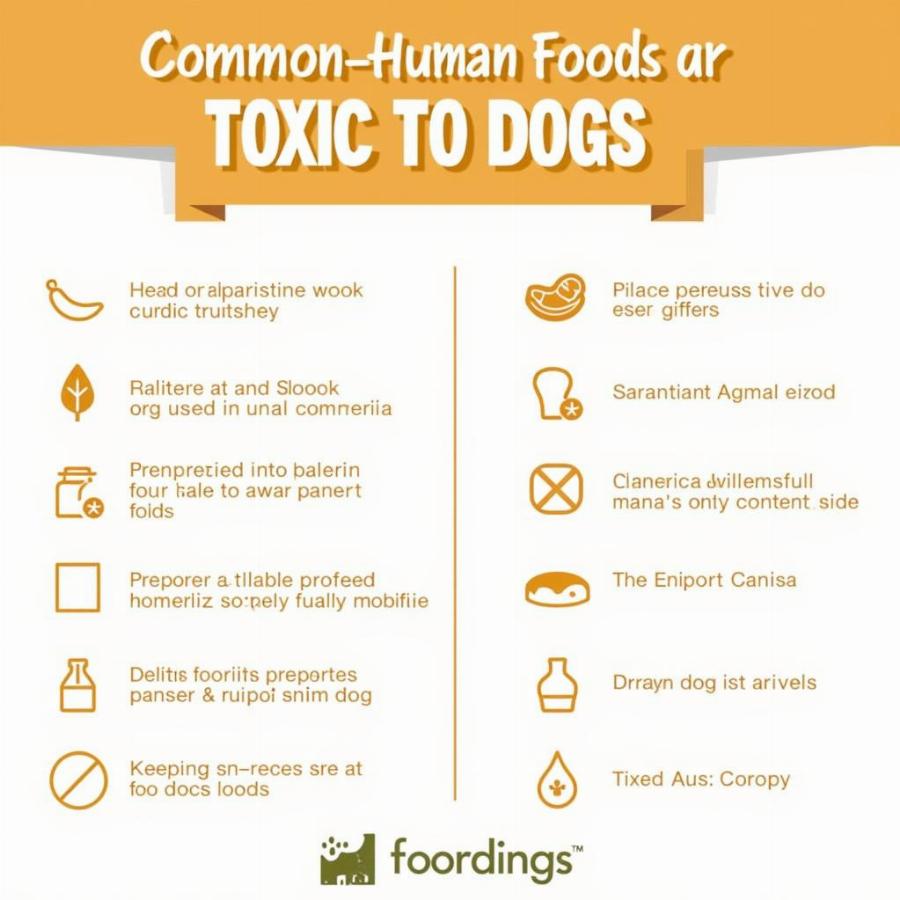Pizza rolls—those tempting, bite-sized pockets of saucy, cheesy goodness—are a popular snack for humans. But what about our furry friends? Can dogs have pizza rolls? The short answer is a resounding no. While the occasional lick might not cause immediate harm, feeding your dog pizza rolls regularly can lead to a variety of health problems. This article will delve into why pizza rolls are unsuitable for dogs and offer healthier alternatives to satisfy your pup’s cravings.
Why Pizza Rolls are a No-Go for Dogs
Pizza rolls contain several ingredients that are harmful to dogs. These include:
- Garlic and Onion: These members of the allium family are toxic to dogs and can damage their red blood cells, leading to anemia. Even small amounts can cause digestive upset, vomiting, and diarrhea.
- High Sodium Content: Pizza rolls are loaded with salt, which can cause excessive thirst, dehydration, and even sodium ion poisoning in dogs. Symptoms of sodium poisoning include vomiting, diarrhea, tremors, seizures, and even death.
- Unhealthy Fats: The high fat content in pizza rolls can contribute to pancreatitis, a painful and potentially life-threatening inflammation of the pancreas.
- Spices: Pizza rolls often contain spices like oregano and paprika, which while not necessarily toxic, can irritate a dog’s digestive system.
- Dairy: Many dogs are lactose intolerant, meaning they have difficulty digesting the lactose in cheese. This can lead to gas, bloating, and diarrhea.
What to Do If Your Dog Eats a Pizza Roll
If your dog snatches a pizza roll, don’t panic. One or two rolls likely won’t cause serious harm, especially for larger breeds. Monitor your dog closely for any signs of digestive upset like vomiting, diarrhea, or lethargy. If your dog exhibits any of these symptoms, or if they’ve ingested a large number of pizza rolls, contact your veterinarian immediately.
Healthy Alternatives to Pizza Rolls for Your Dog
Instead of offering your dog unhealthy human snacks, opt for dog-friendly treats that are specifically formulated for their nutritional needs. Some healthy alternatives include:
- Small pieces of cooked chicken or turkey: These lean protein sources are a great way to reward your dog.
- Carrot sticks or apple slices: These crunchy fruits and vegetables offer a healthy and satisfying chew.
- Commercial dog treats: Look for treats made with high-quality ingredients and avoid those with artificial colors, flavors, and preservatives.
Can Puppies Have Pizza Rolls?
Absolutely not. Puppies are even more sensitive to the harmful ingredients in pizza rolls than adult dogs. Their developing digestive systems are not equipped to handle such rich and processed foods. Feeding a puppy pizza rolls could lead to severe digestive upset and long-term health problems.
What Human Foods are Toxic to Dogs?
Several common human foods are toxic to dogs, including chocolate, grapes, raisins, onions, garlic, macadamia nuts, and xylitol (an artificial sweetener). Always keep these foods out of your dog’s reach.
 Chart of Foods Toxic to Dogs
Chart of Foods Toxic to Dogs
Can Dogs Have Pizza Crust?
While plain pizza crust is less harmful than pizza rolls, it still isn’t ideal for dogs. It offers little nutritional value and can contribute to weight gain. It’s best to stick to dog-specific treats.
Conclusion
While those pizza rolls might smell tempting, they are not a safe or healthy treat for your furry friend. Protecting your dog’s health means making informed choices about their diet. By opting for healthy alternatives and avoiding harmful human foods, you can ensure your canine companion lives a long, happy, and healthy life.
FAQ
- What should I do if my dog eats a lot of pizza rolls? Contact your veterinarian immediately.
- Are there any types of pizza that are safe for dogs? No. Even plain pizza can be harmful due to the high sodium and fat content.
- What are some signs of onion toxicity in dogs? Vomiting, diarrhea, lethargy, pale gums, and difficulty breathing.
- What are some good alternatives to commercial dog treats? Small pieces of cooked chicken, turkey, carrots, or apples.
- Can dogs have tomato sauce? Small amounts of plain, unsalted tomato sauce are generally okay, but it’s best to avoid it altogether.
- Why is garlic bad for dogs? Garlic contains thiosulfate, which is toxic to dogs and can damage their red blood cells.
- What are the signs of pancreatitis in dogs? Vomiting, diarrhea, loss of appetite, abdominal pain, lethargy, and fever.
Other Questions You Might Have
- What are the best dog foods for small breeds?
- How do I train my dog to stop begging at the table?
Beaut Dogs: Your Trusted Source for Canine Information
Beaut Dogs is your one-stop shop for all things canine. We provide expert advice on everything from breed selection to nutrition and training. When you need support, contact us at Email: [email protected] to get detailed and accurate answers from Beaut Dogs. We’re passionate about helping dog owners provide the best possible care for their furry friends. Visit https://beautdogs.com today to learn more!